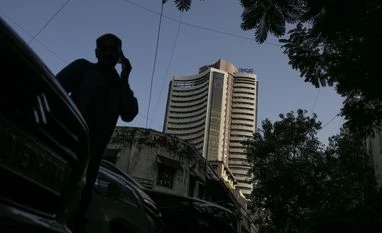Domestic Indian shares rebounded from their one-month lows as a sharp drop in crude oil prices helped assuage investor fears. A retreat in the US bond yields also helped improve risk appetite.
The benchmark Sensex rose 405 points, or 0.62 per cent, to close at 65,632, while the Nifty 50 index gained 110 points, or 0.56 per cent, to end the session at 19,546. Both the indices had declined close to 1 per cent in the previous two trading sessions.
After hitting a 16-year high at 4.88 per cent, the yield on the 10-year US Treasuries fell to 4.74 per cent. Meanwhile, Brent crude prices saw a drop of nearly 6 per cent — the most in more than a year — to trade around $85 a barrel. Last week, the Brent crude prices had climbed to almost $98 a barrel.
The decline in oil prices comes amid concerns that a global economic slowdown will reduce consumption. The sharp spike in oil prices, coupled with hawkish commentary by the US Federal Reserve in late September, had proved to be a double whammy for the equity markets.
Analysts said if oil prices cooled further, it would help ease the pressure on central banks vacillating on keeping interest rates higher. Rising crude oil prices have made India less attractive to its peers due to its high dependence on oil imports.
Some say the recovery in the markets could be feeble because most investors are still apprehensive about the impact of higher interest rates and its corporate earnings.
“This is a relief rally. There was a lot of selling from foreign investors over the past few days. Markets were looking for an excuse to bounce back, and it came in the form of falling crude oil prices and easing bond yields. This is unlikely to be sustainable. If selling by foreign portfolio investors (FPIs) doesn’t reduce, there isn’t much to salvage the market,” said U R Bhat, co-founder of Alphaniti Fintech.
Also Read
FPIs sold shares worth Rs 1,864 crore on Thursday, while their domestic counterparts were net buyers to the tune of Rs 521 crore.
From a year’s low of 3.3 per cent in January, the 10-year US bond yield has seen a sharp spike. Many believe the selloff in the bond markets could lead to a rotation from equities to fixed-income.
“With rates back to 2007 pre-Global Financial Crisis levels, the near 6 per cent annual coupon income from holding investment-grade (IG) bonds is preferred over dividend-yielding equities and cash deposits as the next yield play. In addition, if there are exogenous events that lead to market dislocations, IG bonds would cushion the overall portfolio against any sharp drawdown in equities,” said Hou Wey Fook, chief investment officer, DBS.
Besides the bond yield trajectory, investors will keenly monitor the September quarter result by bellwether companies. Also, the Reserve Bank of India’s (RBI’s) monetary policy decision and the nonfarm payrolls data due on Friday could have bearing on the market sentiment.
“The RBI might keep the rate as it is. But the commentary is more important. If it continues to be hawkish, it will give more impetus to the bearishness. The RBI cannot afford to go soft on the monetary side,” added Bhat.
The market breadth was positive, with 2,226 stocks advancing and 1,433 declining. Two-thirds of Sensex stocks gained. Larsen Toubro rose 2.4 per cent and was the best-performing Sensex stock. It also contributed the most to Sensex gains, followed by ICICI Bank, which rose 1.09 per cent.
)